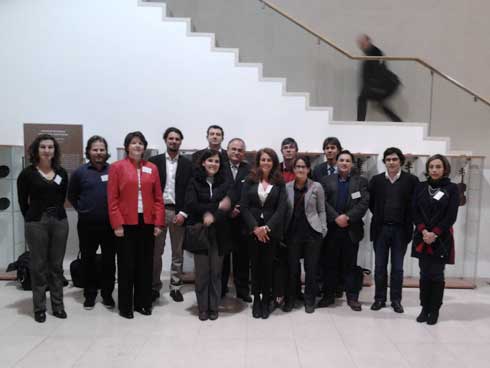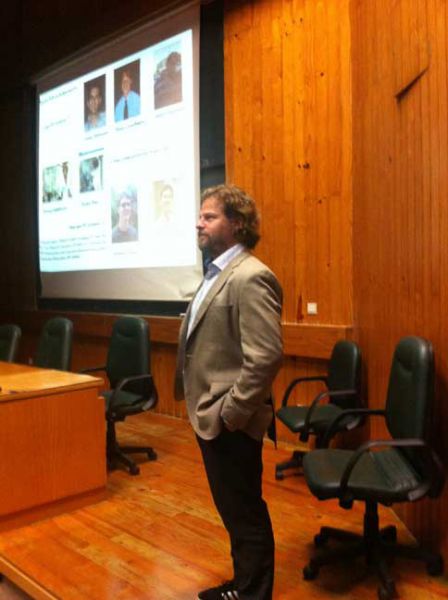CoLab Emerging Technologies program off to a running start
Interdisciplinary research,
education and capacity building
22 May 2014
Nanotechnology and nanoscience have joined the academic areas supported by the UT Austin|Portugal Program.
Since 2013, CoLab has been developing a fourth academic initiative in the emerging area of Nanotechnology in addition to the ones established in 2007 (Advanced Computing, Digital Media, and Mathematics).
The main idea of the UT-Austin|Portugal program in Nanotechnology and Nanoscience is to advance a collaborative vision in nanotechnology research, education, and training, as well as to explore common interests in technology commercialization. Of special interest is promoting the transfer of new nanotechnologies to industry in Portugal and nurturing the formation of new companies located in Portugal to exploit the latest scientific and technological advances. The Emerging Technology / Nanotechnologies program will be coordinated by UT Austin (Brian Korgel) and Portugal (Paula Vilarinho) and has two goals:
1. To enhance Portugal’s graduate programs and research in nanotechnology by creating seamless exchange opportunities for faculty and students to share new knowledge, ideas, experience, and capabilities;
2. To foster economic development in Portugal by bridging UTEN (the CoLab technology commercialization program) with state-of-the-art nanotechnology researchers, with the aim of creating and instituting new best practices for transferring new nanotechnology to the private sector to target global markets.
Alhough the Emerging Technologies program was formally launched only in October 2013, a number of significant activities took place in January through May of this year.
 In January, a kickoff meeting at the University of Aveiro brought together researchers in emerging technologies from UT Austin and five Portuguese universities to share detailed presentation of R&D activities at their institutions and to discuss possible areas of collaboration.
In January, a kickoff meeting at the University of Aveiro brought together researchers in emerging technologies from UT Austin and five Portuguese universities to share detailed presentation of R&D activities at their institutions and to discuss possible areas of collaboration.
The meeting produced terms of reference for the first Emerging Technologies Project Call planned for 2014. The scope of the call was determined to be:
1. Biomedical systems, molecular recognition, scaffolds, biomaterials, tissue engineering, stem cells, nanomedicines, intracellular trafficking, theranostics
2. Nanoparticle systems, nanoparticle assemblies, modelling and optimal design, in situ microscopy, stimuli responsive materials and surfaces, optical and/or magnetic tuning
3. Additive manufacturing, multifunctional nanocomposites, devices with integrated multifunctionality, high throughput, complex (hierarchical) structures, customized (bio)reactors, "printers manufacturers"
In April, the collaboration was broadened with a cross-disciplinary brainstorming session at the University of Aveiro which included researchers from the other CoLab areas. Nine professors in Advanced Computing and Digital Media disciplines from four Portuguese universities joined seven nanoscience and nanotechnology researchers to discuss possible projects.
 In May, the conversation was carried to institutions across Portugal in a nanotechnology roadshow of workshops and meetings. Paula Vilarinho of the University of Aveiro and Brian Korgel of UT Austin gave talks and met with students and researchers at seven universities and research facilities: the International Iberian Nanotechnology Laboratory (INL), Instituto Superior Técnico (IST), the University of Aveiro, the University of Minho, the University of Porto, Innovnano (Coimbra), and Hovione (Loures).
In May, the conversation was carried to institutions across Portugal in a nanotechnology roadshow of workshops and meetings. Paula Vilarinho of the University of Aveiro and Brian Korgel of UT Austin gave talks and met with students and researchers at seven universities and research facilities: the International Iberian Nanotechnology Laboratory (INL), Instituto Superior Técnico (IST), the University of Aveiro, the University of Minho, the University of Porto, Innovnano (Coimbra), and Hovione (Loures).
On the basis of these meetings, plans are underway for a busy 2014-2015 year including the following activities:
- White Paper: Nanosciences and Nanotechnologies in Portugal
- Meetings with Portuguese companies and R&D groups
- Visits by Portuguese faculty and PhD students to UT Austin
- Workshop on Nanotechnologies / preparation for the Project Call (2015)
- International meeting on Emerging Technologies (May 2015, to be confirmed)
For more detail, please see the full report by Paula Vilarinho: Emerging Technologies Report of Activities (January - May 2014).

 News
News
